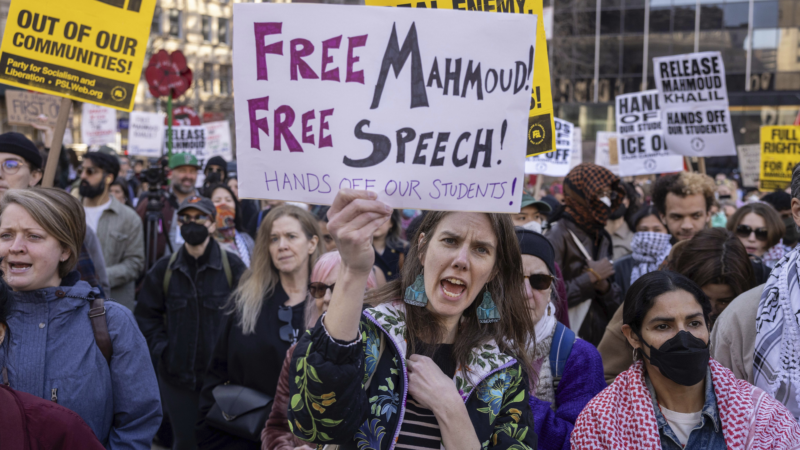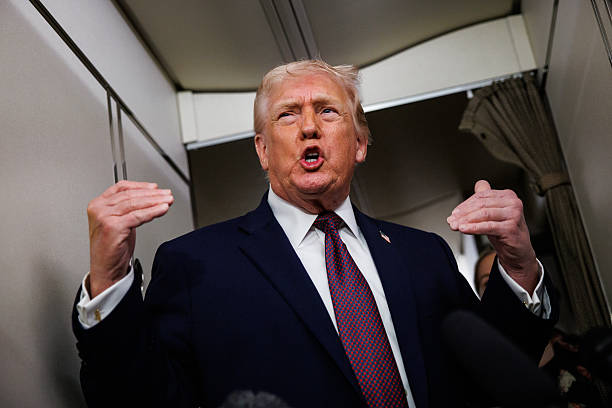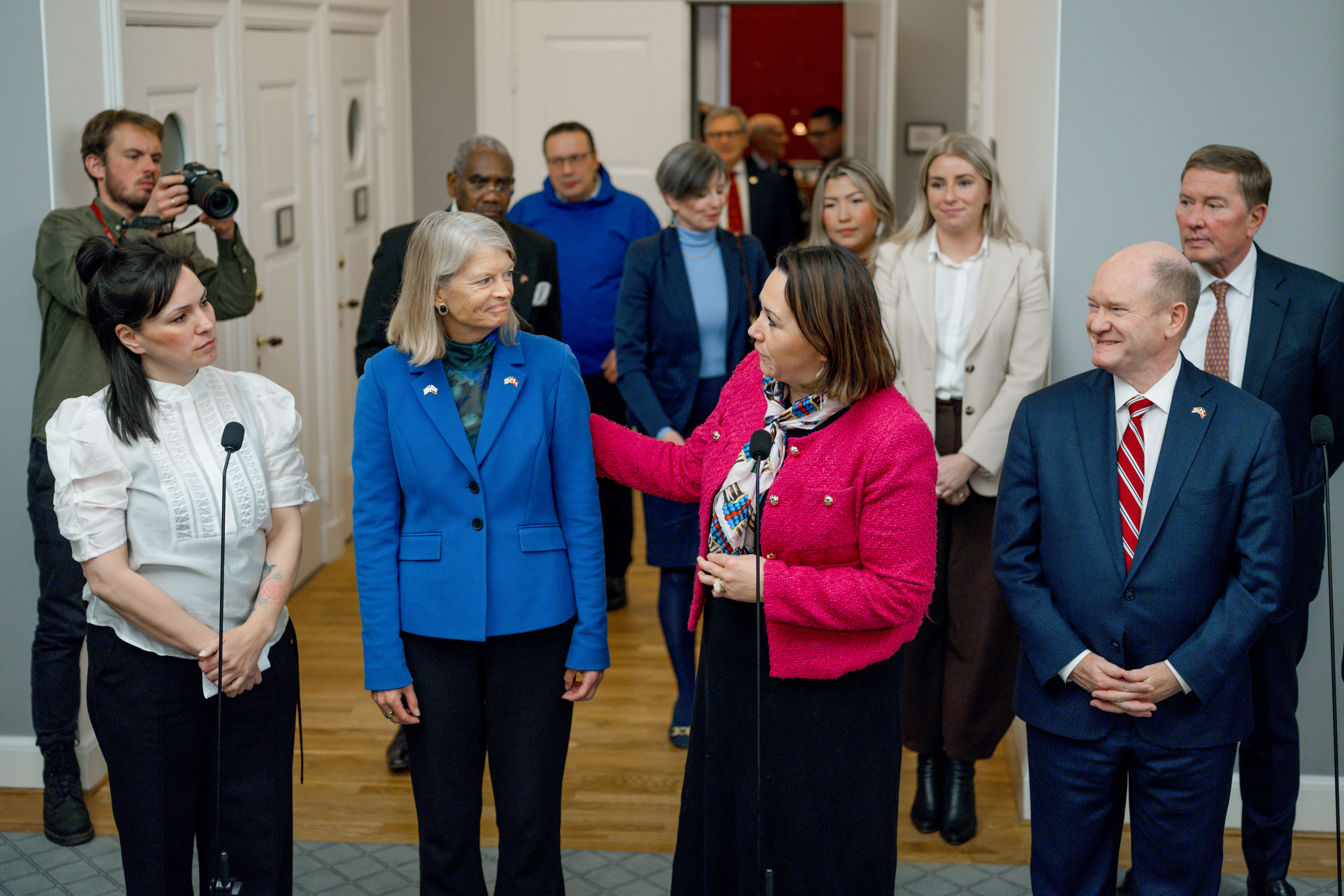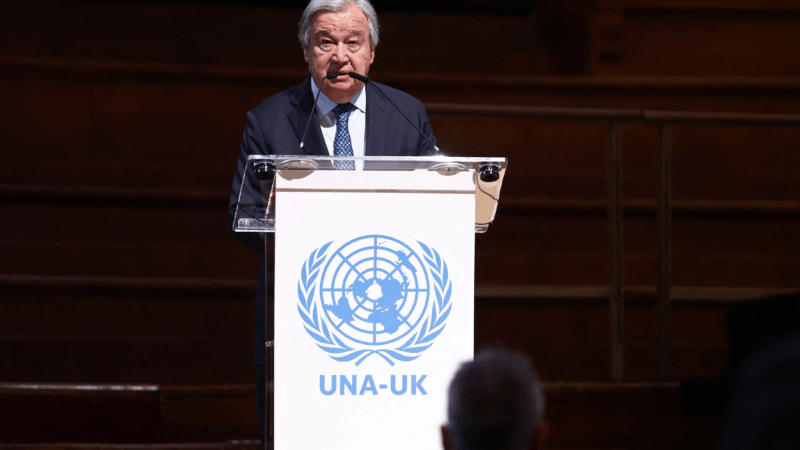International students spoke out against the war in Gaza. Now, some face deportation
In recent weeks, several international university students have been taken by immigration agents or had their legal status questioned.
Turkish graduate student Rumeysa Öztürk was detained by masked agents in plainclothes as she walked to meet friends for dinner. She says she is being targeted over an op-ed about Gaza that she wrote in the Tufts University student newspaper.
Columbia University graduate student Mahmoud Khalil was arrested in his university housing despite being a legal permanent resident. He says he was taken over his peaceful protests against Israel’s war in Gaza.
Columbia University Ph.D. student Ranjani Srinivasan was accused publicly by the Department of Homeland Security of being a terrorist sympathizer, with no evidence, when she got notice that her visa was revoked. She chose to leave.
Their cases raise concerns that more students could be targeted for their views. That alarm is found among free speech advocates across the political spectrum, including pro-Palestinian and pro-Israel groups that uphold the First Amendment for views they both agree and disagree with.
Tune in to NPR and visit NPR.org every day this week for in-depth stories on “The State of the First Amendment: The Right From Which All Other Rights Flow.”
Secretary of State Marco Rubio said he has revoked more than 300 visas and has defended the decisions.
“We gave you a visa to come and study and get a degree, not to become a social activist that tears up our university campus. We’ve given you a visa and you decide to do that — we’re going to take it away,” Rubio said in a recent news conference.
None of these students has been charged with a crime. Instead, the government is using a rarely invoked immigration act that allows the secretary of state to revoke immigration status if the secretary deems their presence a threat to U.S. foreign policy.
The students, their families and their lawyers say these detentions and visa revocations should worry every American.
“This is what happens in a dictatorship, and these are test cases,” said Eric Lee, a lawyer who represents Momodou Taal, a Cornell University Ph.D. student and advocate for Palestinian rights whose visa was revoked. “If the government can get away with doing this to these students, it can do it to everybody in this country. Your citizenship won’t save you. … Your views will be next.”
Taal sued the government on the grounds of free speech this year. After the case was filed, Immigration and Customs Enforcement called on Taal to turn himself in for deportation. Taal didn’t turn himself in and continued the case until just over a week ago, when he issued a public statement on X sharing that he had left the country.

“Given what we have seen across the United States,” he wrote, “I have lost faith that a favourable ruling from the courts would guarantee my personal safety and ability to express my beliefs. I have lost faith I could walk the streets without being abducted.”
The suit has now been withdrawn, but Taal’s lawyers say the implications of this case go well beyond their client.
“The First Amendment applies to people who are physically in the United States, regardless of their alienage, regardless of what country they were born in, regardless of the color of their skin, regardless of their immigration status,” Lee said. “By … saying that attending a protest makes one a threat to American foreign policy, the administration is admitting that the Constitution is getting in the way of the fight for democracy. Something is not right there.”
Defenders of the Trump administration’s policy say it’s about national security.
Critics of the detentions are using words like “abducted” and “disappearing” to describe them, calling them an affront to the Constitution, which protects free speech for immigrants and citizens alike.
The concern centers on a question: Is immigration being used to censor viewpoints?
That question goes beyond these students.
A Nobel Peace Prize laureate and two-time president of Costa Rica recently had his visa revoked. Óscar Arias Sánchez was told it was because of his close ties to China. He resumed relations with the country in his second term as president from 2006 to 2010.
Arias has been a vocal critic of President Trump online, comparing him to a “Roman emperor, telling the rest of the world what to do” in a social media post.
“I have to imagine that my criticism of President Trump might have played a role,” he said in a recent interview with NPR. “The president has a personality that is not open to criticism or disagreements.”
The detentions and visa revocations have some other green-card holders and visa holders, even those who are not students, watching and worrying.
Raymond, a lawful permanent resident from Hong Kong who asked us not to use his full name in case it impacts his immigration status, said he worries that political opinions he has shared online might be used against him when returning to the United States. He’s not a student, but he said he has started scrubbing his social media and he’s considering hiding his Instagram app before an upcoming trip abroad for a wedding.
For the first time since he has been in the United States, he also thinks about what he says and does publicly.

“I don’t join protests now,” he said. “I feel like it’s a stupid thing because I feel like I’m now being compliant before the thing even hits me. But it also feels like the risk is higher … that there’s a higher chance that my legal status is going to be in jeopardy.”
Nothing has happened to Raymond. But because of what he’s seeing, he’s choosing to be silent in public spaces to protect himself.
“The lack of due process is what concerns me more when it comes to freedom of speech,” he said.
Trump has rolled out many of the Project 2025 policies he once claimed ignorance about
Some of the 2025 policies that have been implemented include cracking down on immigration and dismantling the Department of Education.
U.S. lawmakers wrap reassurance tour in Denmark as tensions around Greenland grow
A bipartisan congressional delegation traveled to Denmark to try to deescalate rising tensions. Just as they were finishing, President Trump announced new tariffs on the country until it agrees to his plan of acquiring Greenland.
Can exercise and anti-inflammatories fend off aging? A study aims to find out
New research is underway to test whether a combination of high-intensity interval training and generic medicines can slow down aging and fend off age-related diseases. Here's how it might work.
The 2026 Olympics are the most widespread in history. See what’s happening where
Competitions will be hosted at 25 venues spanning an area of more than 8,000 square miles. Here's what's happening at each of the four main clusters.
High-speed trains collide after one derails in southern Spain, killing at least 21
The crash happened in Spain's Andalusia province. Officials fear the death toll may rise.
United Nations leaders bemoan global turmoil as the General Assembly turns 80
On Saturday, the UNGA celebrated its 80th birthday in London. Speakers including U.N. Secretary-General António Guterres addressed global uncertainty during the second term of President Trump.






